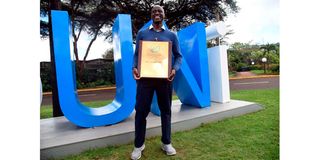Teacher Tabichi joins push for girl-child education

Peter Tabichi - the 2019 Global Teacher Prize winner has joined other stakeholders in asking the global community to promote the training of female learners in technology.
What you need to know:
- Award-winning teacher Peter Tabichi has joined leading international educators and institutions in advocating for the education of girls.
- Says girls have as much potential as boys to perform exceptionally well in the classroom as long as they are given the right support and encouragement.
Award-winning teacher Peter Tabichi has joined leading international educators and institutions in advocating for the education of girls disadvantaged in online education and digital skills.
In the aftermath of Covid-19, it has emerged that 11 million girls risk dropping out of school. The drastic shift to online learning widened the gender divide in education owing to the disparities in access to technology and the digital skills required to use it.
In an open letter following the Building the Bandwidth Summit convened by the Varkey Foundation, Unesco and CJ Cultural Foundation, the 2019 Global Teacher Prize winner joins other stakeholders in asking the global community to promote the training of female learners in technology.
“Girls have as much potential as boys to perform exceptionally well in the classroom as long as they are given the right support and encouragement. I feel proud when I see my female students from poor, rural schools take trophies in national and international science contests,” said Mr Tabichi.
“Already, we have made a huge progress on girls’ education and we should not allow the pandemic to derail that. World leaders have to prioritise the education of female learners and protect financing for it,” he added.
Technology
Other signatories in the letter include Henrietta Fore Giannini (Executive Director of Unicef), Stefania Giannini (Assistant Director General for Education at Unesco) and Yasmine Sherif (Director of Education Cannot Wait) who fear that the inequalities constitute problems to girls’ education.
The letter reveals that more men than women are well versed with technology as they use the Internet more often. Global System for Mobile Communications (GSMA) also shows that women in low and middle income nations are seven per cent less likely to own a mobile phone and 15 per cent less likely to use mobile Internet.
Another concern pertains to the safety of girls who are on the Internet as they are more likely to experience online bullying.
“The World Wide Web Foundation found that 52 per cent of young women and girls have been abused, threatened, sexually harassed or have received private images without their consent,” reads the report.
Ms Giannini says half of young women and girls have been abused in the online space.
Gender divide
Owing to the risk posed by the Internet, many parents and guardians resort to limiting their daughters’ time online, although the report also suggests that the disparities are compounded by diminishing domestic and international financing budgets caused by the pandemic. According to the report, Unesco and the World Bank estimate that external aid for education may fall by $2 billion from 2020 levels.
The signatories recommend that there is need to protect and prioritise financing for girls’ education, promote access to technology and resources needed for effective learning. They also propose implementation of action plans that promote STEM subjects, building of digital skills through gender-free curricula, and enhancement of cooperation among stakeholders to reduce the gender divide.
The math and physics teacher has become popular for the strides he has made in encouraging learners’ access to technology for the purpose of online learning.
Following suspension of learning last year due to Covid-19, he raised money and purchased smartphones for 35 students to coordinate online learning. Last month, he partnered with the Safaricom Foundation to donate computers and Internet connectivity to Keriko Mixed Secondary School in Nakuru.





